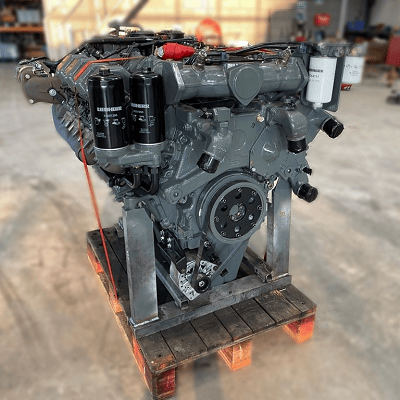The process of a dyno test on a Liebherr engine

When it comes to heavy machinery, reliability and power are paramount. Liebherr, a name synonymous with innovation and excellence in engineering, stands tall as a pioneer in the realm of heavy equipment and machinery. From towering cranes to robust excavators, Liebherr’s engineering prowess extends to the heart of these machines. We delve into the world of dyno testing a Liebherr engine, uncovering the meticulous process behind unleashing the raw power concealed within.
The foundation of excellence
Before we embark on the journey of dyno testing, it’s crucial to understand the foundation upon which Liebherr engines are built. With decades of engineering expertise and commitment to quality, Liebherr engines are crafted to withstand the most demanding environment and deliver unparalleled performance. Each component is meticulously designed and rigorously tested to ensure reliability, efficiency and longevity.
The process
1 Preparation: The engine undergoes meticulous preparation before being mounted onto the dynamo meter. This includes ensuring all connections are secure, fluids are filled to the appropriate levels, and sensors are properly calibrated.
2 Mounting: The engine is carefully mounted onto the dynamometer, a specialized device designed to simulate real-world operating conditions. Precision is paramount during this step to ensure accurate results.
3 Initial checks: Once mounted, a series of initial checks are conducted to verify proper alignment, connection integrity, and functionality of all engine systems.
4 Warm-up: The engine is started and allowed to warm up to operating temperature. This ensures consistent results and minimizes the risk of damage during testing.
5 Baseline testing: With the engine warmed up , baseline tests are conducted to establish initial performance metrics. This includes measuring power output, torque, fuel consumption, and emissions at various RPM levels.
6 Load testing: The engine is subjected to progressively increasing loads to simulate different operating conditions, such as idle, partial load and full load. This allows engineers to assess performance across the entire operating range and identify any potential issues or optimization.
7 Data analysis: Throughout the testing process, data is continuously collected and analyzed in real-time. Advanced instrumentation and software are used to monitor performance metrics and identify trends or anomalies.
8 Optimazation: Based on the data analysis, adjustments may be made to optimize engine performance. This could involve fine-tuning fuel injection timing, adjusting air-fuel ratios, or optimize turbocharger boost pressure.
9 Validation: Once testing is complete, the results are meticulously reviewed and validated against predetermined criteria and specifications. Any deviations or anomalies are thoroughly investigated to ensure accuracy and reliability.
10 Reporting: Finally, a comprehensive report is generated detailing the results of the dyno testing, including performance metrics, observations, and any recommendations for further optimization or refinement.
The outcome of dyno testing
Dyno testing a Liebherr engine is more than just a routine procedure – it’s a testament to the unwavering commitment to excellence that defines Liebherr’s engineering philosophy. By subjecting their engines to rigorous testing and analysis, Liebherr ensures that each engine delivers the uncompromising performance, reliability, and efficiency that customers expect.
In conclusion, dyno testing a Liebherr engine is not just about measuring power output. It’s about unlocking the true potential of these remarkable engines and ensuring they exceed expectations in the most challenging environments imaginable.
Pioneering agricultural and sanitation solutions, we are acclaimed as a foremost China Suction Truck manufacturer—specialists in Three-Wheel Fecal Suction Trucks. Engineered for efficiency and built for endurance, our trucks are designed to handle demanding farm and municipal tasks with ease.
Opting for high-quality, our Agricultural Manure Suction Trucks epitomize functionality and reliability in the field. These vehicles are equipped to handle large volumes of manure, streamlining the process of cleaning livestock facilities and enriching farmland fertilization practices. Their compact yet powerful build allows for smooth operation in various terrains, ensuring every drop is collected with minimal effort.
Our Diesel Self-Priming Fecal Suction Trucks raise the bar in self-contained pumping systems. Ideal for both rural and urban applications, these trucks boast a self-priming mechanism that facilitates immediate and continuous suction, reducing downtime and maximizing productivity. Equipped with diesel engines renowned for their ruggedness and fuel efficiency, they guarantee optimal performance over long hours and distances.
With a focus on durability and performance, our suction trucks are manufactured to withstand the rigors of daily use. From farmyard to cityscape, these versatile trucks are ready to face whatever challenge comes their way. Choose from our wide array of models, and witness how superior craftsmanship meets practicality, driving results where they matter most.
Suction Truck,Three-Wheel Fecal Suction Truck,Agricultural Manure Suction Truck,Diesel Self-Priming Fecal Suction Truck
Henan Lukewei Road Machinery Manufacturing Co.,Ltd , https://www.lukeweimachinery.com